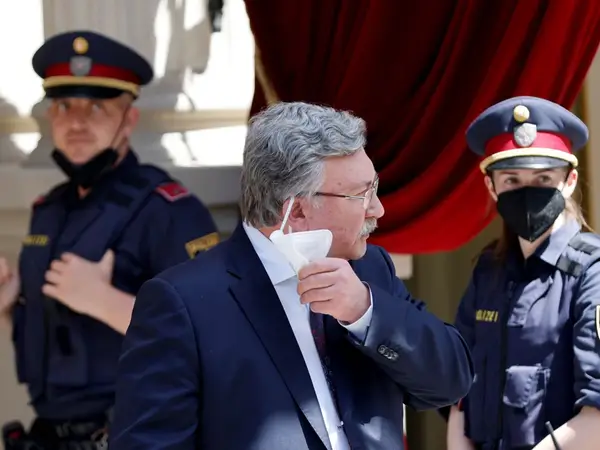Russia has signaled its continued commitment to collective nuclear diplomacy with Iran in Vienna and emphasized the need for an early Iranian return to talks.
In a no-nonsense interview Wednesday with Iran International TV, Mikhail Ulyanov, Russia’s ambassador to the International Atomic Energy Agency, confronted what he called “misunderstanding” and “misinterpretation.”
Ulyanov was probably in part referring to reports that Iran had requested a meeting with the European Union in Brussels to slow down the resumption of talks in Vienna over reviving the 2015 deal as tactic to gain an advantage. “Further delay may be counterproductive,” he said.
The envoy clearly downplayed reports that Iran is seeking to persuade the EU to influence the United States over the talks, which have been suspended since June in their efforts to revive the 2015 deal, the JCPOA (Joint Comprehensive Plan of Action).
“My good colleague Enrique Mora from the European Union visited Tehran October 14, the Iranian side in its turn expressed willingness to pay a visit to Brussels before the end of the month,” said Ulyanov. “So what?”
The ambassador pointed out that Mora − the EU foreign policy chief who coordinates the JCPOA Joint Commission, the formal body for the Vienna talks − could not negotiate for other state signatories.
“Real negotiations can take place only in Vienna in a multilateral format with proper proxy participation of the United States,” said Ulyanov. Washington, which left the JCPOA in 2018, takes part indirectly in Vienna alongside the remaining JCPOA signatories – China, France, Germany, Iran, Russia and the United Kingdom.
While the US state department said Monday it saw no need for the possible Brussels meeting, Ulyanov compared the proposal in terms of “normal diplomatic practice” to Iranian foreign minister Hossein Amir-Abdollahian’s October 6 visit to Moscow and Amir-Abdollahian’s October 15 phone-call with Sergei Lavrov, the Russian foreign minister. As an attendee of the Moscow meeting, Ulyanov said he had found it productive.
The remaining 10%
Nonetheless, “close contacts with Iranian counterparts…should not be interpreted as a separate track of negotiations between Russia and Tehran on nuclear issues,” Ulyanov said.
The envoy expressed Moscow’s understanding that the new Iranian administration of President Ebrahim Raisi (Raeesi) “some time to be prepared, to establish a new negotiating team,” just as it had taken the US administration of President Joe Biden two months in office to enter the Vienna talks.
But Ulyanov also said Russia had “expected the talks to resume in a couple of weeks” and that it was now “high time” to resume. He pointed out it was four calendar months since the sixth round in Vienna ended June 20.
Ulyanov judged that 90 percent of the challenges involved in reviving the JCPOA had been settled in Vienna. The remaining 10 percent were “rather controversial” issues, but despite this and the “time-consuming” process, he said the “chances for success are rather high.”
The “10 percent” reportedly involved reaching agreement over which US sanctions, including those imposed as it left the JCPOA in 2018, needed to be lifted for Washington to return to the nuclear deal, and how Iran should reverse the steps it has taken since 2019 in expanding and improving its nuclear program.
